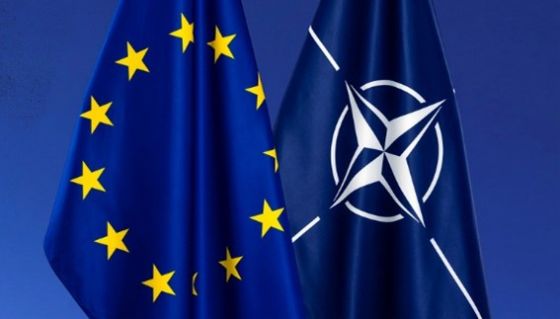Perspectives on EU NATO relations in an emerging world order
A DSE debate at Copenhagen Business School
24 October 2024 16.00 – 18.00
Contact Person: Magali Gravier, mg.msc@cbs.dk

(source: www.nato.int)
Programme
16.00-16.15 Welcoming words
- Ms. Magali Gravier, Assoc. Prof., Copenhagen Business School, Vice-President of the Danish Association for European Studies.
- Mr. Peter Møllgaard, President of Copenhagen Business School.
- Ms. Sevasti Chatzopoulou, Assoc. Prof., Roskilde University, President of the Danish Association for European Studies
16.15-17.00 Panel presentations
- Ms. Line Nybo Hall, Security Policy Director from the Danish Ministry of Foreign Affairs.
- Mr. Frisell, Deputy Director-General and Head of the Security Policy from the Swedish Ministry of Foreign Affais.
- Mr. Michel Soula, Head of Section of Multilateral Organizations, in charge of NATO – EU partnership.
- Mr. Guillem Riutord Sampol, Head of Division, EEAS/EU.
- Moderator: Maria Mälksoo, Professor at Copenhagen University.
17.00-17.10 Short break
17.10-18.00 Discussion
18.00-19.30 Refreshments
_____________________________________________________________
Rarely in its history has the EU been in a situation where it faced so many endogenous and exogenous challenges at a time. It can be argued that some of these challenges are essentially endogenous, like Brexit, while others are mainly exogenous, like the war in Ukraine. As a peace keeping organization, the EU was largely unprepared for a war at its borders. With the USA withdrawing from multilateralism under the Trump presidency and French President Macron famously declaring that NATO was brain dead in 2019, NATO also experienced challenging times, appearing undermined from its own member countries. Yet, the war in Ukraine gave the North-Atlantic alliance not only a revival, but the opportunity to grow. Two EU member states – Sweden and Finland – which had refrained from NATO membership until then decided to apply for membership, bringing the two regional organizations even closer.
While some observers claim that we are still in the “same old” world order, it can also be argued that a new world order is emerging. The dominance of Western countries is increasingly challenged not just by the “Global South”, but maybe more by the non-democratic world. Two wars are raging close to the EU: one in Ukraine since 2022 and one in the Middle East, with consequences that are difficult to read for observers.
This debate will offer the opportunity for speakers from the EU and NATO but also from two member states – Denmark and Sweden – to share their thoughts on the relations between these two regional organizations. How do they see these relations evolve over time? What are the implications of an increased direct border between the EU/NATO and Russia in the North of Europe? What are the risks for European citizens, particularly in Eastern and Northern Europe? How do the two ongoing conflicts affect each other and what response can both organizations contribute to bring? What about new technologies and cyber security? Is democracy at risk?

